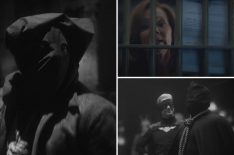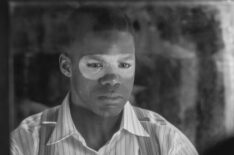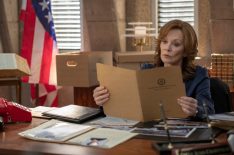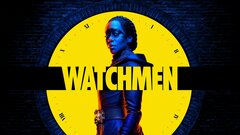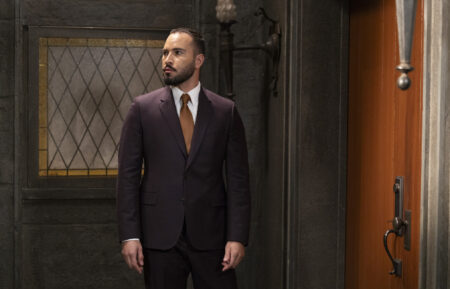A Shocking Dr. Manhattan Reveal Shakes Everything Up in ‘Watchmen’ (RECAP)
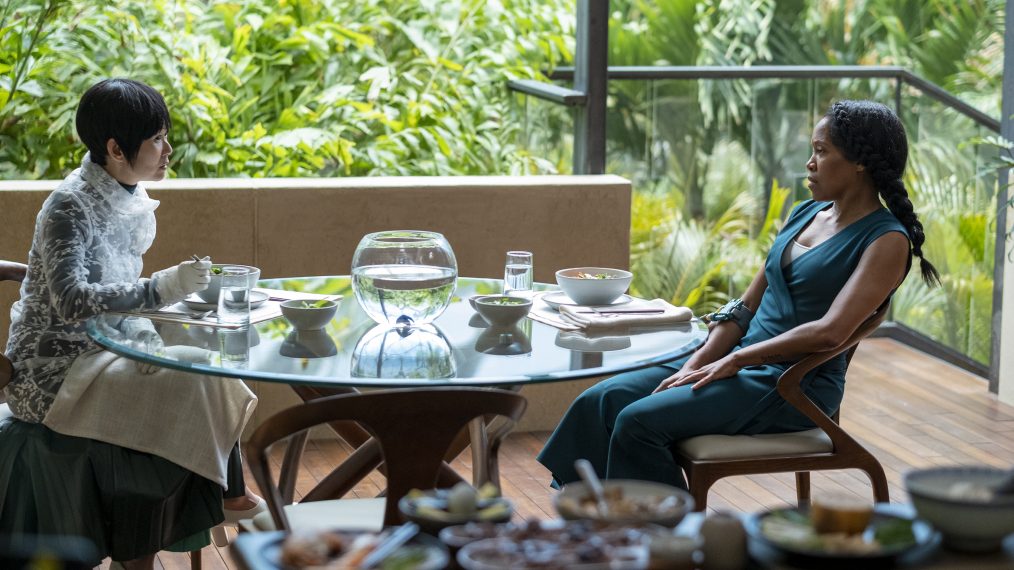
Spoiler Alert
[Warning: The below contains MAJOR spoilers for Watchmen Season 1 Episode 7, “An Almost Religious Awe.”]
Somewhere around the mid-point of the season, specifically the Looking Glass origin story, Damon Lindelof’s Watchmen went from a very good show to a great show, and it hasn’t let up since. That momentum continues this week in “An Almost Religious Awe” (written by Stacy Osei-Kuffour & Claire Kiechel), another hour of bold storytelling, thrilling surprises, and dazzling visual flourishes. Other than one big gaseous misstep (which I’ll get to later), this episode stands up as one of the best of the season.
In a show where characters hide their true feelings and intentions behind a mask, it’s refreshing to see plans finally divulged here. Firstly, the mysterious Lady Trieu (Hong Chau) admits to injecting Nostalgia into her daughter, Bian (Jolie Hoang-Rappaport), who it turns out isn’t her daughter at all, but in fact, a clone of her mother! It’s evidence of Lady Trieu’s hypocrisy, as she claims publicly to have invented Nostalgia so that people could learn from the past and evolve, to move into the future rather than fixate on the past. And yet, she refuses to move on.
Trieu also tells Angela (Regina King) that her grandfather, Will (Louis Gossett Jr.), came to her to help stop the Seventh Kavalry, who apparently plans to destroy and then become Dr. Manhattan. “That’s the craziest s**t I’ve ever heard,” says Angela, who spends the majority of the episode hooked up to tubes in Trieu’s Tulsa facility, drifting in and out of memories. But it’s the truth. We now know that Senator Joe Keene (James Wolk) and the 7K are a modernized version of the Cyclops—the underground white supremacist group that Will (aka Hooded Justice) uncovered back in the 1930s.
Meanwhile, Agent Laurie Blake (Jean Smart) finds herself at the mercy of the 7K after she confronts Jane Crawford (Frances Fisher) about her late husband’s secret racist life. Of course, Jane knew all about Judd’s extracurricular activities and doesn’t even try to feign ignorance. Instead, she sends Laurie awkwardly (and hilariously) crashing through a trap door in her living room—once she can get the remote control working, that is. “A trap door, really?” Laurie mocks when she comes face to face with Senator Keene.
Laurie’s “seen-it-all-before” disdain adds some necessary humor to the proceedings, which could otherwise come across as self-serious or overindulgent. “Want me to ask you about your plan? Fine. Just know I don’t give a s**t,” she tells Keene. The thing is, though, a lot of Laurie’s nonchalance is a front, a sort of mask of her own making. She acts unfazed, but she knows Keene’s rhetoric about “restoring the country’s balance” is dangerous. “It’s extremely difficult to be a white man in America right now,” he says, a statement as laughable as it is scary, given it’s a viewpoint shared by certain people in the real world. “So, I might try to be a blue one.”
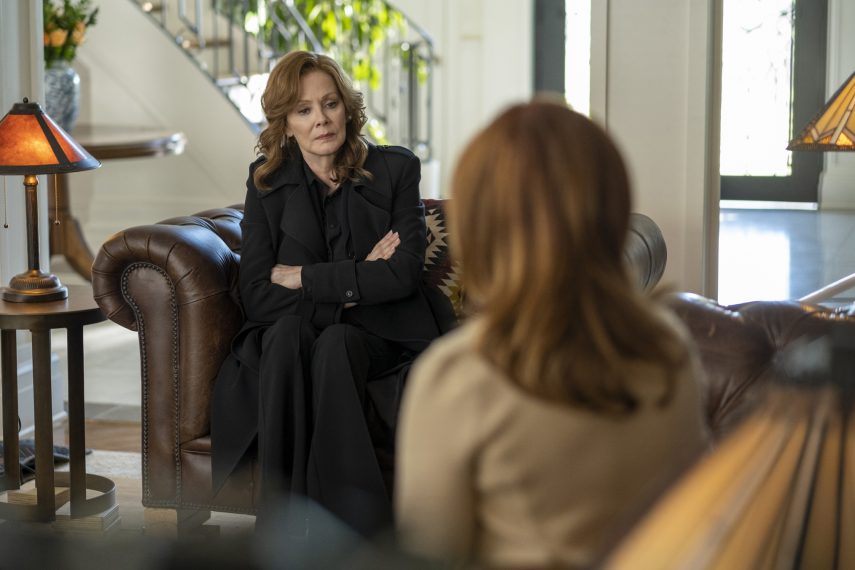
HBO
Speaking of the “blue one,” Dr. Manhattan is central to the plans and the events of this episode, despite not physically appearing himself—well, at least not in blue form. Arguably the most iconic character from the original comic, Dr. Manhattan has operated on the outskirts of the season so far. He’s been referenced in news footage, stage-plays, and even sex toys, but he hasn’t had a direct impact on the narrative. However, Dr. Manhattan is always present, or perhaps a better word is omnipresent. Even from a whole light year away, his foreboding presence is felt… and boy is it felt in a big way this episode.
Just as last week’s “This Extraordinary Being” reshaped Watchmen history with its Hooded Justice revelation, so too does “An Almost Religious Awe,” which drops a nuclear-sized bombshell in its closing moments. There’s no point burying the headline any longer: Dr. Manhattan is not on Mars; he’s on Earth, in Tulsa, disguised as a human. The fact that that human turns out to be Angela’s husband Cal (Yahya Abdul-Mateen II) is just one of many head-spinning reveals across this episode.
Even more shocking is that Angela knew about this all along and was protecting Dr. Manhattan by hiding him in a human host; Cal’s amnesia-causing “car accident” was merely a cover story. I guess Angela’s father was right when he said: “People who wear masks are dangerous… they’re hiding something.” This is an absolute game-changer. And just when the other plotlines were starting to come into focus! I like to think that Angela bashing Cal’s brains in with a hammer was a visual representation of how the audience felt in that precise moment. I’m still trying to wrap my head around it. Was Cal a clone? How long has Dr. Manhattan been on Earth? And what is his connection to Angela?
I think to answer some of those questions, you have to go back to Angela’s childhood. Thankfully, due to her Nostalgia overdose, we flashback to early 80s Saigon, where a 10-year-old Angela witnesses the death of her parents in a horrifying terrorist attack (a scene reminiscent of the Tulsa massacre, where her grandfather lost both his parents). This brutal bombing, committed by a disillusioned youth, was done in protest against the Americanisation of Vietnam, which was declared the 51st state after America won the Vietnam War—thanks to the intervention of one Dr. Manhattan.
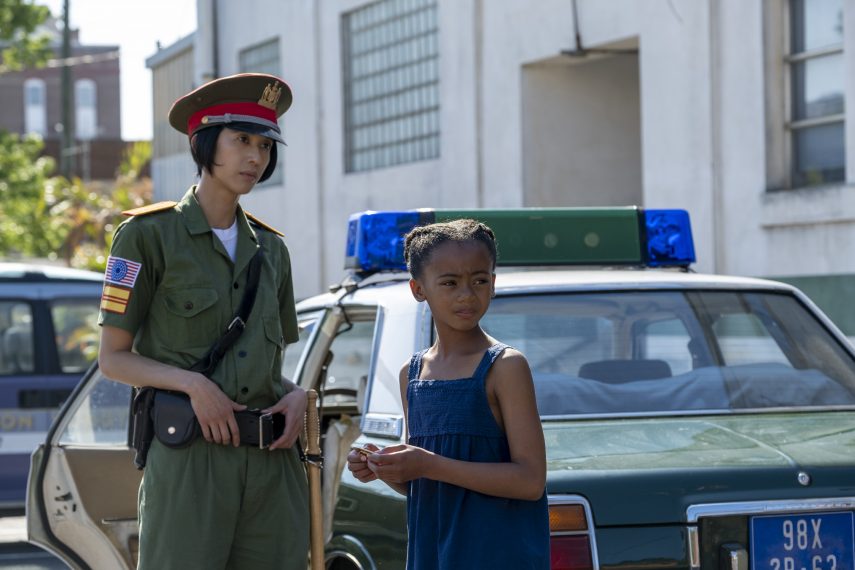
HBO
Angela grew up in a time and a city where Dr. Manhattan loomed large. His image was everywhere, from posters to puppet shows to street art graffiti. His powers were transferred into “Manhattan-Made” products, such as Lithium-powered Timex watches and Ford cars, which became the must-have luxuries of the generation. Schoolchildren painted Dr. Manhattan Russian Dolls in class, the same way they would decorate eggs for Easter. Dr. Manhattan was presented as the embodiment of the American dream. A hero. A savior. A god.
But, as the brilliant PBS-style documentary which opens the episode reveals, Dr. Manhattan, aka Jon Osterman, is a figure both worshipped and feared. The immigrant son of a poor clockmaker, Osterman’s fate with an Intrinsic Field Generator—which split his body and consciousness through time—turned him into the world’s first “real” superhero, one with actual superpowers. The U.S. government capitalized by weaponizing him against their enemies. Does that make Dr. Manhattan “a liberating hero who single-handedly ended the war?” Or a “cold, blue conqueror who decimated an entire way of life?” It’s a question that tortured Dr. Manhattan, who chose to abandon humanity and live out his days alone on Mars.
It’s understandable why Angela would be drawn to Dr. Manhattan. She knows what it’s like to be alone and stand out as an other. Growing up in Vietnam, and in an orphanage following the death of her parents, there weren’t many people who looked like her. That’s why she was so attracted to Sister Night—a blaxploitation movie she rented from a local video store (though her parents would never let her watch). “She looks like me,” Angela says of the black woman in the nun outfit gracing the VHS cover.
Angela also grew up around death. Both her parents died in front of her. Her grandma June (Will’s estranged wife) died of a heart attack just as she was about to take her home to Tulsa. She lost her police partner during the 7K’s savage White Night attack. Everyone she loves or might have loved is dead. So, of course, she’d want to be with the one person who can’t die. The immortal blue man to whom death is not a finality but merely a flash in a person’s continually existing timeline. It also doesn’t go unnoticed that a woman who dresses like a nun is engrossed by a man who is essentially a god. How and when Angela met Dr. Manhattan is currently unexplained… but I’m intrigued as all hell to find out.
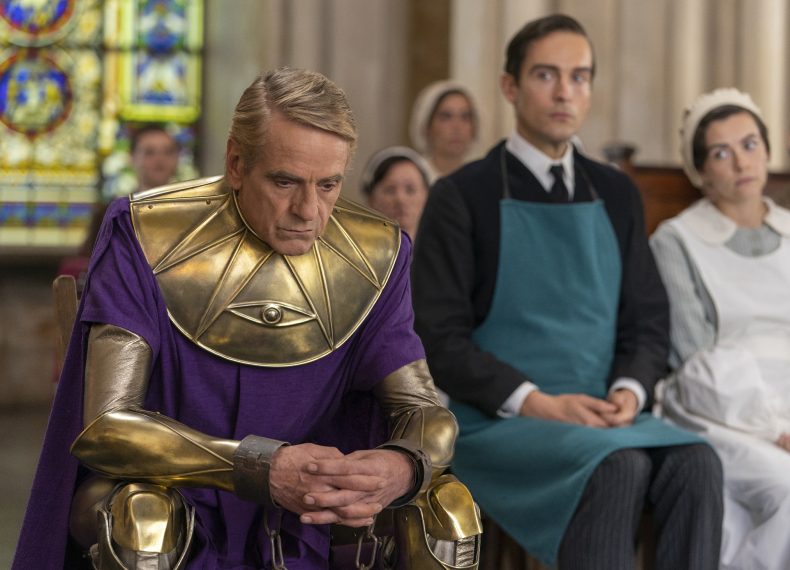
HBO
If there is one downside to this otherwise excellent episode, it’s our weekly call-in with Adrian Veidt (Jeremy Irons). I’ve mostly enjoyed these absurd interludes throughout the season, but I have to admit, they’re becoming tiresome. When everything else is starting to come together, Veidt’s moon-based clone nonsense feels too disconnected. Don’t get me wrong, the mock English courtroom drama is well done, with Ms. Crookshanks posing as a stern prosecutor (an impressive performance from Sara Vickers), but the humor didn’t land for me this time. That could be because I hate fart jokes, so Veidt’s intestinal expulsion as a means of defense just made me cringe.
That shouldn’t take away from the rest of the episode, though, which was an audacious and illuminating piece of television. It’s an episode that provided clarity in one respect, as it laid out the 7K’s plans in detail, but by the end, confounded us even more, with a reveal which still has me reeling. If they can just bring Veidt into the main narrative next week (and with the launch of Trieu’s Millenium Clock imminent, that is hopefully on the agenda), then these final two episodes should be must-see.
Additional Notes
- We must address the elephant in the room… and by that, I mean the literal elephant, which was hooked up to Angela in the Trieu facility. What was all that about? An elaborate “an elephant never forgets” metaphor tied to the Nostalgia memories? Or am I missing something more profound?
- The Sister Night movie has the best tagline: “THE NUN WITH THE MOTHER%&$ING GUN.”
- There were some beautiful visuals in this episode, especially in the scenes set in America-adopted Saigon. But my favorite was the close-up of Angela’s eyes fading into the stained glass windows of Veidt’s courtroom.
- No Looking Glass (Tim Blake Nelson) this week, but Agent Dale Petey (Dustin Ingram) did find five 7K members slaughtered in Wade’s bunker, which at the very least, means he survived the ambush.
- Dr. Manhattan was actually in this episode, but not in his usual naked blue guise, but in the form of a floating hydrogen atom symbol, which Angela pulled out of her dead husband’s head (this is a weird show!).
Watchmen, Sundays, 9/8c, HBO
From TV Guide Magazine
Crime, Comedy & Convenience Stores: Unwrapping Hulu's 'Deli Boys' With the Cast
Cupcakes, corndogs…and cocaine?! Two brothers find themselves in a hilarious pickle when they inherit an unseemly bodega biz in Hulu’s new comedy Deli Boys. Find out how The Sopranos and Real Housewives of Orange County influenced the cast. Read the story now on TV Insider.

